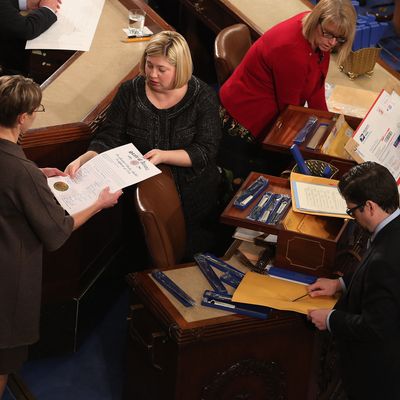
Amid the tears and fears surrounding Hillary Clinton’s upset loss to Donald Trump on Tuesday is the slowly growing realization that she will very likely wind up winning the popular vote. She’s in the lead right now, and, best we can tell, the bulk of the uncounted vote is from states (especially states like California and Washington with heavy voting by mail and a provision allowing ballots postmarked by Election Day to be counted) she has won handily.
To put it another way, the candidate who is now being questioned and denounced in many quarters as a disastrous loser is also the sixth of the last seven Democratic presidential nominees to win a popular-vote plurality.
That’s right: Clinton seems poised to join Al Gore (along with two 19th-century Democrats) as candidates who were robbed of the presidency by the continuation of that quaint and usually irrelevant institution the Electoral College.
As realization of this fact sinks in, calls for abolishing this archaic institution are sure to spread. Yes, Electoral College fans will wail in protest at the idea that this part of the founders’ design might be eliminated. But as I pointed out on a recent radio show on this subject, under the founders’ design, Hillary Clinton (and probably President Obama) would have not even been able to vote, and we’d be using a system whereby the loser of the presidential election would be a viper in the bosom of the new administration as vice-president.
The bigger problem with the bright idea of killing the Electoral College, as Julia Azari notes at FiveThirtyEight, is how easy it is for the small states that benefit from it to block a constitutional amendment in the U.S. Senate, or block its ratification by the states themselves (it just takes one-fourth of them plus one). There’s a reason only two constitutional amendments have been enacted in the last 45 years — and why the last one (the 27th Amendment prohibiting members of Congress from voting themselves instant salary increases) took 202 years to ratify.
As it happens, there is a way around the constitutional-amendment process and its small-state veto power: the National Popular Vote initiative. It is an interstate compact whereby states agree to cast their electoral votes for the popular-vote winner. It becomes effective once states controlling 270 electoral votes agree to it. So it basically nullifies the Electoral College without abolishing it.
At present, 11 jurisdictions (ten states plus the District of Columbia) representing 61 percent of the electoral votes needed to make it effective have signed onto the agreement. Earlier momentum has been stalled by the current dominance of state governments by Republicans, who (rightfully, it would seem) perceive themselves as benefiting from the status quo. It’s a good reason, in addition to such obvious considerations as redistricting and the considerable power of state governments, that Democrats might want to place a real premium on making large gains at the state level in 2018.






























